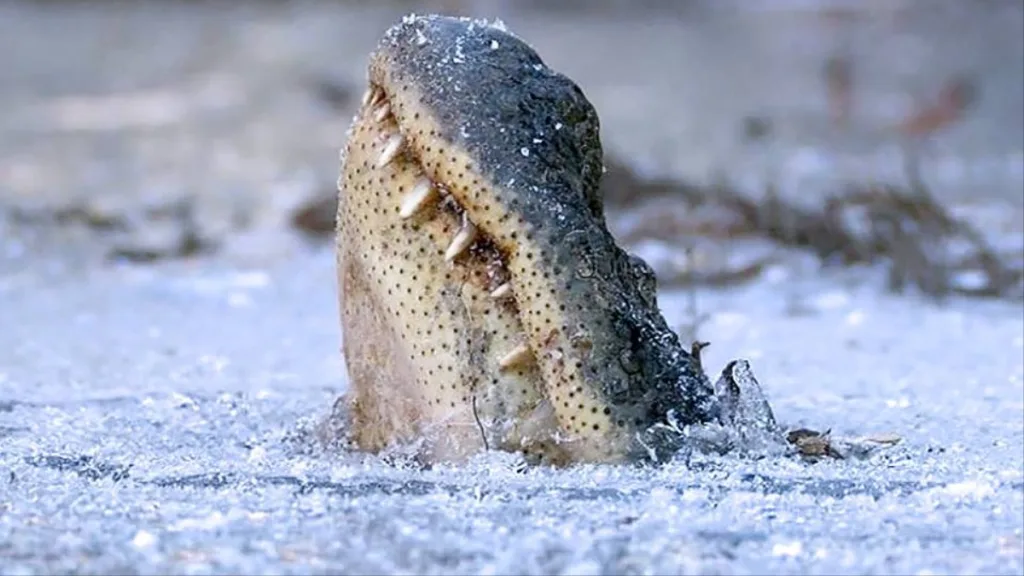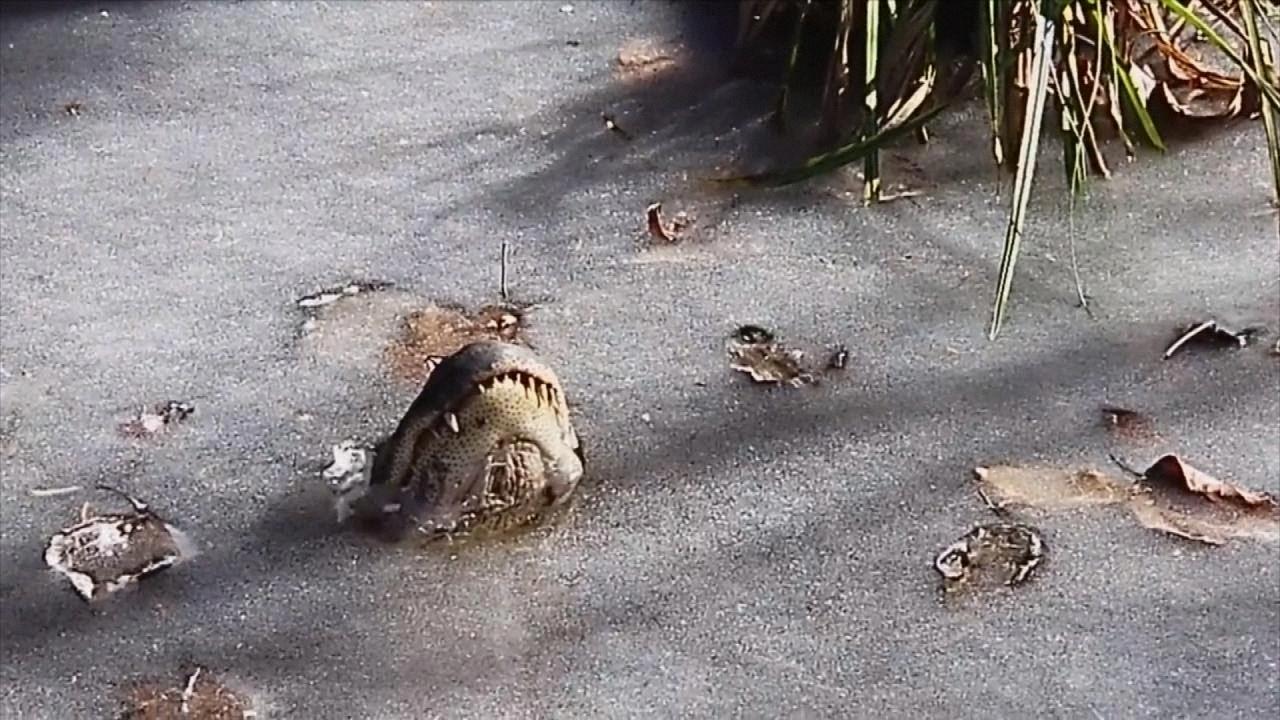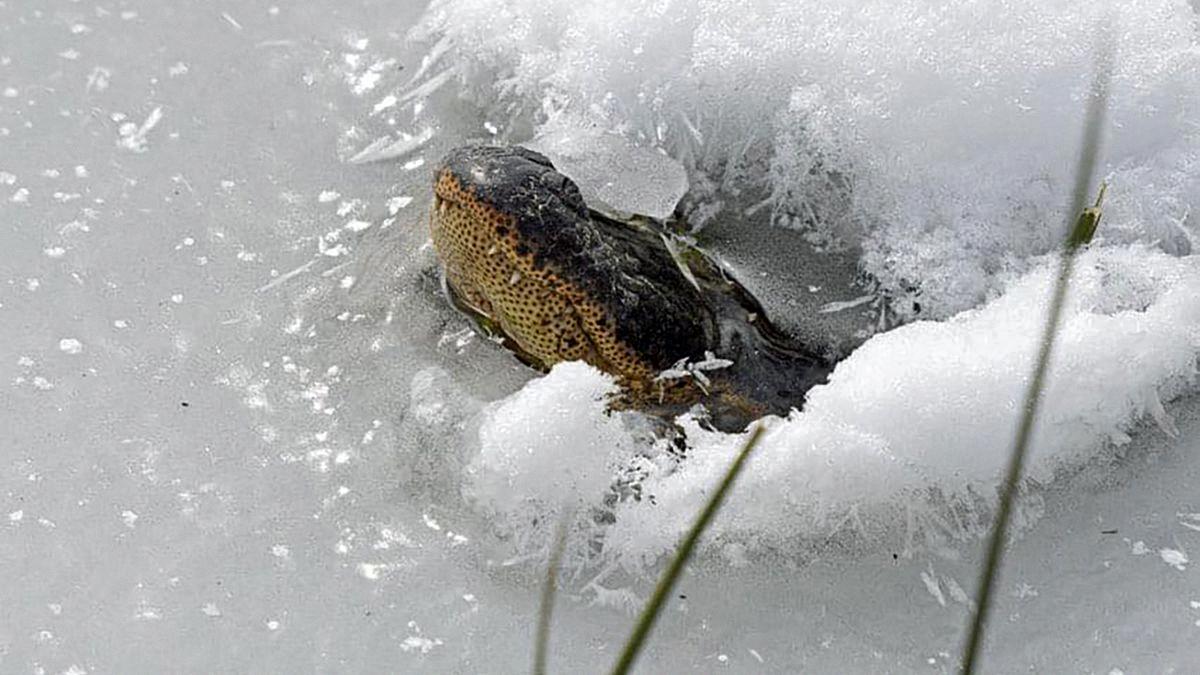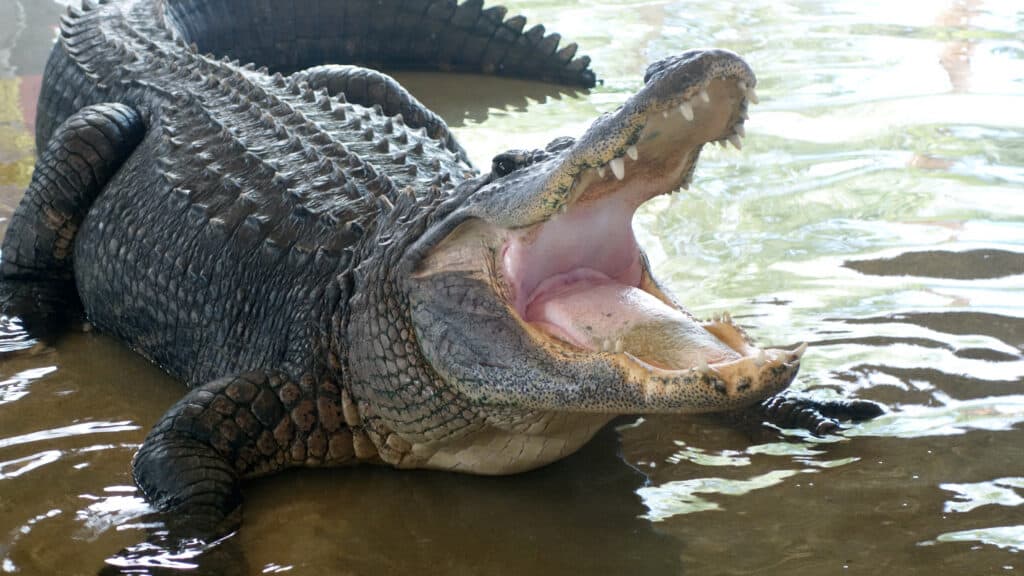As the winter months approach, many animals begin to prepare for hibernation. However, have you ever wondered if alligators hibernate like other cold-blooded reptiles? The answer is no, alligators do not hibernate, but they do undergo a similar process called brumation.
During brumation, an alligator’s metabolism slows down, allowing the reptile to go without food and just “chill” for four to five months. This period usualy occurs from late November to early March, depending on the location and climate. While in brumation, alligators remain in the water during cold weather and often retreat into dens beneath the bank where air pockets occur.
However, it’s important to note that alligators can’t let their bodies get too cold, or they will die. As cold-blooded reptiles, alligators rely on their external environments for temperature regulation, which means cold weather is not conducive to their survival. By lowering their metabolic rates, becoming lethargic and keeping their snouts above water, alligators are able to survive brief periods of freezing weather.
It’s also worth mentioning that alligators don’t migrate like some other animals, such as birds, do. They stay in their habitats year-round, which means they have to adapt to the changing seasons. Unlike hibernation, which is a prolonged state of dormancy, brumation is a brief period of inactivity that allows alligators to conserve energy and survive the winter months.
Alligators do not hibernate, but they do undergo brumation, a process that allows them to slow down their metabolism and survive the winter months. By staying in the water and retreating into dens beneath the bank, alligators are able to adapt to their environment and conserve energy. So, the next time you see an alligator during the winter months, remember that it’s not hibernating, but rather just taking a break from its normal routine.
Hibernation Duration of Alligators
Alligators do not actually hibernate, but they undergo a similar process called brumation. During brumation, alligators’ metabolism slows down, and they become less active. They can go without food for about four to five months during this period. However, they cannot let their bodies get too cold, or they will die. Therefore, alligators will seek out warm areas, such as sunlit banks or shallow water, to regulate their body temperature. Overall, brumation is essential for alligators to conserve energy and survive during the colder months.

How Do Alligators Survive the Winter?
During cold weather, alligators tend to remain in the water and may even resort to staying completely submerged for extended periods. As the temperatures drop, they oftn retreat into dens beneath the bank where air pockets occur, allowing them to breathe while remaining out of the cold. These dens can be found in a variety of locations, including in the mud, under overhanging vegetation, or in hollow trees. Additionally, alligators may also seek out warm spots, such as near hot springs or power plant discharge areas, to help regulate their body temperature during the winter months. Overall, alligators have developed several strategies to survive the colder temperatures of winter, including retreating to dens and seeking out warm areas to help them endure until the warmer months return.
Can Alligators Survive Winter?
Yes, alligators can survive winter, however, it can be a challenging time for them. Alligators are cold-blooded reptiles, which means they rely on their external environment to regulate their body temperature. As the temperature drops, their metabolic rate slows down, causing them to beome lethargic and less active. During winter, alligators in areas with freezing temperatures may enter a state of “brumation,” which is similar to hibernation in mammals. They lower their metabolic rates, become less active, and reduce their food intake. To survive brief periods of freezing weather, alligators may keep their snouts above water and remain motionless to conserve energy. However, prolonged exposure to freezing temperatures can be fatal to alligators. Overall, while alligators can survive winter, they must rely on their adaptations and behaviors to do so.
Do Alligators Migrate or Hibernate?
Alligators are reptiles that live in freshwater habitats, such as swamps, marshes, and rivers. Unlike some birds and mammals, alligators do not migrate. They are cold-blooded animals that rely on the temperature of their surroundings to regulate their metabolism and behavior. During the winter months, alligators may become less active and spend more time basking in the sun to warm up. However, they do not hibernate in the same way that some mammals do. Instead, alligators may enter a state of torpor, which is a period of reduced metabolic activity. During this time, they may slow down their movements and eat less, but they do not sleep for an extended period like hibernating animals. Overall, alligators do not migrate or hibernate, but they do have adaptations that alow them to survive in their environment throughout the year.
The Lowest Temperature an Alligator Can Survive
The North American Alligator, a cold-blooded creature, is known for its ability to survive in various temperatures. However, it might surprise you to learn that they can even tolerate water temperatures as low as 40 degrees Fahrenheit. This means that they can survive in extremely cold conditions, which is impressive considering they were once nearly extinct. Although they are adaptable and have been around for millions of years, it’s important to note that prolonged exposure to extremely cold temperatures can still be harmful to alligators, just like any other living organism.

Source: youtube.com
Inactivity Temperature of Alligators
Alligators become inactive at temperatures below 55o F (13o C). This is bcause they are ectothermic and rely on external sources of heat to maintain their body temperature. They are most active at warmer temperatures between 82o to 92o F (28o to 33o C). When the ambient temperature drops below 70o F (21o C), they stop feeding and become less active. As the temperature continues to drop, alligators become increasingly dormant until they reach a point where they are essentially immobile. Therefore, if the temperature drops below 55o F (13o C), alligators become inactive and enter a state of dormancy until the temperature rises again.
What To Do If Faced With an Alligator Chase
If you find youself being chased by an alligator, the first thing you should do is run away in a straight line. Contrary to popular belief, zig-zagging will not help you outrun an alligator. Although they can move quickly on land, they can only do so in short bursts and distances before they tire out.
If you have any objects within reach, try to jam them into the back of the alligator’s mouth to trigger their gag reflex. This may cause the alligator to release its grip on you and give you a chance to escape.
It’s important to remember that prevention is key when it comes to alligator encounters. Avoid swimming in bodies of water where alligators may be present, and always keep a safe distance if you do encounter one. Additionally, never feed or approach an alligator, as this can lead to dangerous behavior.
If you are bitten by an alligator, seek medical attention immediately. Alligator bites can be very serious and require prompt medical treatment to prevent infection and other complications.
Where Are Alligators Found in the United States?
American alligators are found in several US states, including Florida, southern Texas, Louisiana, North and South Carolina, Georgia, and Alabama. In recent years, there have been reports of alligator sightings in areas further north than their traditional range, suggesting that their distribution may be expanding. It is important to note that alligators are primarily freshwater animals and are typically found in swamps, marshes, and rivers. While they occasionally venture into saltwater, they are not typically found in coastal areas or the open ocean.
Are Alligators Nocturnal?
Yes, alligators are active at night. They are diurnal and nocturnal, which means they are active dring both the day and night. Alligators have adapted to their environment and have developed the ability to see well in low light conditions, allowing them to hunt and forage for food at night. They are also more active during the warmer months of the year and can often be seen basking in the sun during the day. However, they typically retreat to their dens at night for protection and warmth. So while they may not be as visible at night, they are still active and on the move.

Source: cnn.com
The Benefits of Freezing for Alligators
Actually, alligators don’t intentionally freeze themselves. Instead, they enter a state of brumation, which is similar to hibernation, when they sense the onset of cold weather. During this period, their metabolism slows down significantly, and they become less active. However, their breathing rate remains constant, and they still need to take in oxygen to survive. To achieve this, alligators use a technique called “icing” or “snorkeling,” which involves poking their nostrils through the ice to breathe. This way, they can obtain the necessary oxygen whle conserving their energy and staying safe from predators. Overall, brumation is a natural survival strategy that allows alligators to cope with the harsh winter conditions in their environment.
Where Do Alligators Sleep at Night?
Alligators typically sleep overnight in tunnels that they dig in the mud or in gator holes. These tunnels serve as a safe and protected space for them to rest during the night. Interestingly, when the alligators emerge from their sleeping tunnels, other animals often move in and inhabit the area. It is difficult to determine precisely how long alligators sleep in their tunnels, but they typically emerge from dormancy when the weather begins to warm up.
How Long Do Alligators Sleep?
Alligators are known for their long sleeping hours, and they typically spend up to 17 hours sleeping within a 24-hour cycle. This extensive sleeping pattern is due to the fact that alligators are cold-blooded animals, and they do not require frequent meals throughout the day. During the daytime, alligators prefer to bask in the sun or rest, and their sleep is crucial to their survival as it helps conserve their energy. While alligators are not the only animals that sleep for extended periods, their sleep patterns are an essential aspect of their biology and behavior.
The Activity of Alligators in Florida During Winter
Alligators are not as active in Florida during the winter season as they are in the warmer months. During this time, they enter a state of dormancy and can be found in burrows or dens that they construct near an alligator hole or open water. While they may occasionally emerge to bask in the sun during warm spells, they generally remain inactive throughout the winter. Therefore, if you are visiting Florida during the winter season, you are less likey to encounter active alligators than during the warmer months. However, it is still important to exercise caution and adhere to all posted warning signs near bodies of water, as alligators can still pose a potential threat to humans.

Conclusion
In conclusion, alligators do not hibernate in the traditional sense. Instead, they enter a state of brumation, which involves a slowing down of their metabolism and a decreased need for food. During this time, alligators remain in the water and may retreat into dens beneath the bank whee air pockets occur. While they can survive brief periods of freezing weather, they must keep their bodies from getting too cold. As cold-blooded reptiles, alligators rely on their external environments for temperature regulation, making cold weather challenging for their survival. Though they cannot migrate, alligators have adapted to survive during the winter months through their unique brumation state.
